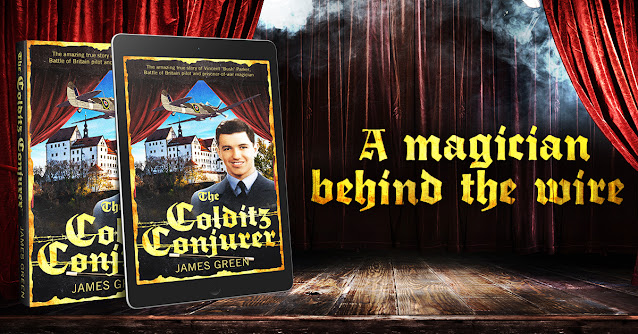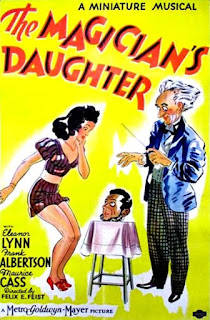Ben Ali Libi: Dutch magician murdered at Sobibor
Dutch poet and writer Willem Wilmink's most famous poem was Ben Ali Libi. It was inspired by a Dutch-Jewish magician, murdered by Nazi Germany during World War Two. But, was Ben Ali Libi a fictional character, or did he really exist? Read on, to find out...
On a list of artists, all killed in the war,
I spotted a name I'd not heard of before,
intrigued and excited, I looked up each fact,
about Ben Ali Libi, the magical act...
– Willem Wilmink
Professor Ben Ali Libi was indeed a real person. He was born Michel Velleman, on 5 January 1895 in The Netherlands. He came from a poor Jewish family and grew up in Amsterdam’s Koestraat, a slum area for ‘second-class citizens.’
Little is known of Velleman’s early life. He probably started off as a young marketplace performer, which was a common trade. He may also have been mobilised as a soldier during World War One. (Although he wouldn't have seen any fighting as The Netherlands remained neutral throughout the war.)
But by his mid twenties, with the war over, Velleman was a full-time magician and children’s party organiser, using the whimsical name Professor Ben Ali Libi.
He married Anna (‘Annie’) Speijer in 1918, and the couple had two children; a daughter, Aaltje and a son, Jack.
Over time, Velleman became a well-established comedy magician and worked throughout The Netherlands. As well as working for child audiences, he also performed “a fine nightclub act,” wrote fellow Dutch-Jewish magician Emil M. Loew after the war. “A kind man, a jester, funny and high-spirited, Michel had a powerful stage presence,” recalled one of his cousins.
Velleman laid claim to having performed for Prince Hendrik of The Netherlands, the prince consort of Queen Wilhelmina. He also gave a performance for the former German Emperor Wilhelm II, who lived in exile in the Dutch state after his forced abdication at the end of World War One. These appearances showed Velleman’s success as a magician and led him to use the billing ‘royal magician.’
The Jewish Weekly reported an appearance by Velleman at a Jewish summer school in 1941. “The children spent happy hours with Prof. Ben Ali Libi, the humorous magician who performed the most marvellous tricks.” After this, there are only a few mentions of him in the press.
Money became tight and Velleman tried to make-up his income by offering magic classes for children. To cut down their bills, the family moved from Biesboschstraat to an apartment in Merwedeplein 59, a cheaper part of Amsterdam.
From January 1942, the Germans sent more and more Jewish men to labour camps in the Netherlands. Velleman escaped this fate, but there are records of him performing at some of these camps.
Then, in July 1942, the Germans started deporting Jews from The Netherlands and other occupied countries, like France and Belgium.
The German police widely used misinformation and deception to transport the Jewish population bit by bit, without it leading to too many people going into hiding or to too much resistance. For example, they issued tens of thousands of provisional exceptions, known as a ‘Speere,’ which were later rescinded one by one. Like many others, the Vellemans didn’t believe the situation would become so bad, and when it did, it was too difficult for them to escape.
But tragedy soon struck the family. Quietly, from January 1942, the Nazis had been emptying out Jewish hospitals, orphanages and homes for the elderly, one after the other. Michel and Annie’s handicapped daughter Aaltje lived in one of those institutions. In May 1943, 24-year old Aaltje was deported and murdered.
The news of Aaltje’s deportation must have devastated Michel and Annie. The only consolation may have been that they didn’t learn of her death.
*****
On Sunday 20 June 1943, there was a loud knock on the door of Velleman’s third-floor apartment at Merwedeplein 59. Dragged from their home without warning, Michel and Annie Velleman were bundled into a truck. Knowing that most Jews would be at home on the Sabbath, the Nazis rounded up several thousand of them that day.
Fortunately, Jack wasn’t at home when the Nazis came. When he got back to the apartment, and found out what had happened, he fled in case they came back for him.
The truck took 48-year old Michel and Annie to the Hollandsche Schouwburg, which had been converted into a deportation centre, for initial processing.
From the Hollandsche Schouwburg, that same evening, the Vellemans were sent by train to the Westerbork transit camp in the country's northeast. Westerbork was a staging camp from where the Germans would deport Jews and other untermensch (sub-humans: Nazi term) to camps in Germany or Poland. Camp Westerbork had a school, orchestra, hairdresser and other facilities, designed by S.S. officials to give inmates a false sense of hope for survival and to aid in avoiding problems during their onward transportation.
They arrived at Westerbork in the evening, were registered, had their valuables taken from them and received a medical examination before being allowed into the main barracks to rest.
Michel was separated from Annie, as the German guards put men in separate accommodation from the women and children. But he was able to visit the women’s section during the day. It is possible that Michel performed tricks there for the children, doing what he could to calm their fears. After all, he'd been doing just that in his day-care role, until he was deported.
The Vellemans spent just over a week at Westerbork. The camp population was transient and people moved on quickly to make space for others coming in. On 29 June 1943, they were forced onto another train, and sent almost 900 miles east to Sobibor in Poland. The journey took three days, crammed into a carriage meant for freight or livestock.
Immediately upon their arrival in Sobibor, Michel and Annie Velleman, along with the other deportees, were made to surrender their baggage. The guards then separated the men and women. They ordered them to remove their clothes and to walk naked in groups of several hundred along a road for a shower.
In fact, the showers were gas chambers. Within an hour of their arrival at Sobibor, stripped naked, Michel and Annie Velleman were murdered.
It was the same camp where Aaltje Velleman, their daughter, was killed two months earlier.
*****
Jack Velleman fled to rural France after the Nazis took his mother and father. He lived there for several years, working on farms where he hoped the Germans wouldn’t spot him as a Jew. He returned to Amsterdam after the war and tried to find his father and mother, helped by the Red Cross and other organisations. His search was in vain.
The Dutch magic magazine TRIKS wrote in October 1945, “Ben Ali-Libi, the man who kept captivating his audience with a simple program, was deported shortly before Louis Lam in early 1943. Since no reports of him have yet been received, we are still uncertain about the fate that has befallen him.”
Michel Velleman’s fate was not formally confirmed until early 1950, when the Netherlands Staatscourant published the date and place of his death; 2 July 1943, the day he arrived in Sobibor.
There were 140,000 Dutch Jews in 1939. By the war’s end, only 35,000 survived.
*****
Years after the war, poet Willem Wilmink saw the name Ben Ali Libi at an exhibition which included a list of artistes who died at the hands of the Nazis. Wilmink was struck by the ludicrous notion that for Nazi Germany to achieve their ‘thousand-year Reich’, “they first needed to get rid of some poor magician who performed at parties and weddings... otherwise they couldn’t proceed with their plan.” Few other occupations could be so harmless, leading Wilmink to write the poem as a testimony to the barbarousness and stupidity of the Holocaust. The poem was set to music by Dutch composer Harry Bannink and gained popular recognition.
Ben Ali Libi
On a list of artists, all killed in the war,
I spotted a name I’d not heard of before,
intrigued and excited, I looked up each fact,
about Ben Ali Libi, the magical act.
With a smile and a quip and a box full of tricks
and a well-chosen stage name thrown into the mix,
he scrapes out a living, as best he can:
Ben Ali Libi, the magician man.
It was then that Lady Rost* and her friends
thought that The Netherlands ought to be cleansed
of the global Jewish-Bolshevik opposition,
and, of course, this meant the little magician.
He’ll hide away flowers and doves with great stealth,
but when they come a-knocking, he can’t hide himself,
and outside the police vans take up position,
for Ben Ali Libi, the children’s magician.
And who knows, perhaps in Sobibor’s darkest hours,
he showed fellow inmates the best of his powers,
with a laugh and a quip and a box full of thrills,
Ben Ali Libi’s magical skills.
So nowadays, when I see some loudmouth attacking our democracy,
I ask: In your heaven, is there space that you know,
for Ben Ali Libi and his conjuring show?
For Ben Ali Libi, the little schlemiel,
may his soul rest in with God now, peaceful and still.
- Willem Wilmink (translated from Dutch)
* Lady Rost was the wife of Meinoud Rost van Tonningen, a prominent Dutch Nazi. He was captured by the Canadian allies and died in 1945 before the end of his trial. His wife held on to, and defended, the Nazi ideology until her death in 2007.
Michel Velleman was one of many Jewish magicians to die at the hands of the Nazis during the war. Other Dutch Jewish magicians killed at Sobibor include Blitz (Malovitz or Maloitz) a mentalist and muscle reader, and Louis Lam (see blog link below).




















Comments
Post a Comment